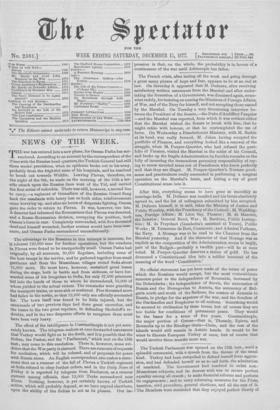The French crisis, after lasting all the week and going
through a great many phases of hope and fear, appears to be at an end at last. On Saturday it appeared that M. Dufaure, after receiving satisfactory written assurances from the Marshal and after under- taking the formation of a Government, was dismissed again, some- what rudely, for insisting on naming the Ministers of Foreign Affairs, of War, and of the Navy for himself, and not accepting those named by the Marshal. On Tuesday a very threatening interview be- tween the President of the Senate,—the Duke d'Audiffret Pasquier —and the Marshal was reported, from which it was evident either that the Marshal wished the Senate to break with him, that he might retire with honour, or that he contemplated the use of force. On Wednesday a Dissolutionist Ministry, with M. Batbie at its head, was really formed, M. Jahan having accepted the portfolio of Finance, and everything looked like a renewal of the struggle, when M. Pouyer-Quertier, who had refused the port- folio of Finance, visited the Marshal in the midst of his Council, and broke up the fragile Administration by forcible remarks on the folly of incurring the tremendous pecuniary responsibility of try- ing to screw unvoted taxes out of Frenchmen who know perfectly well that they are illegal. M. Pouyer-Quertier's Norman good- sense and practicalness really succeeded in performing a surgical operation on the Marshal's brain, and letting a ray of good Constitutional sense into it.










































